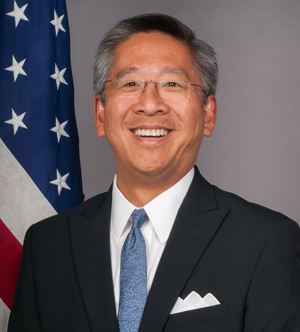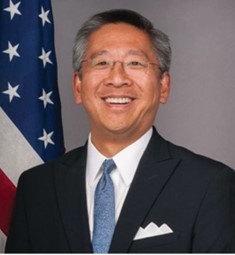Exclusive: Donald Statement to be Read by Donald Lu in the Congressional Hearing
Mr. Chairman, Mr. Ranking Member, colleagues,
When I was a junior officer in Peshawar, Pakistan 31 years ago, I saw up close a Pakistani election. I saw the election irregularities along with the courage of Pakistani voters who turned up despite

threats of violence and intimidation.
Three decades ago, it was a contest between Nawaz Sharif, brother of the current Prime Minister, and the late Benazir Bhutto, whose son and husband now lead the Pakistan People’s Party.
Today, I propose saying a few words about where the election on February 8 fell short, where we saw positive elements, and what lies ahead for U.S. policy in Pakistan.
Election Irregularities
The day after the elections, the State Department issued a clear statement:
- Noting undue restrictions on the freedoms of expression, association, and peaceful assembly.
- Condemning electoral violence and restrictions on human rights and fundamental freedoms.
- Condemning attacks on media workers, and restrictions on access to the internet and telecommunication services.
- Expressing concern about allegations of interference in the electoral process and stating claims of interference or fraud should be fully
Let me drill down a bit deeper into our observations. We were particularly concerned about electoral abuses and violence that happened in the weeks leading up to the elections. First, there were attacks against police, politicians, and political gatherings by terrorist groups. Second, many journalists, particularly female journalists, were harassed and abused by party supporters. And several
political leaders were disadvantaged by the inability to register specific candidates and political parties.
On the day of the elections, an internationally respected local election monitoring organization said that they were barred from observing vote tabulation in more than half of the constituencies across the country. And despite a high court instruction not to interrupt internet service on election day, authorities shut down mobile data services, the principal means by which Pakistanis access social media and messaging applications.
Progress in Participation
There were positive elements as well in these elections. Despite threats of violence, over 60 million Pakistanis voted, including over 21 million women. Voters elected 50 percent more women to Parliament than they did in 2018. In addition to a record number of women candidates, there were record numbers of members of religious and ethnic minority groups and young people running for seats in Parliament.
Voters in Pakistan had a choice. A range of political parties won seats in national and provincial assemblies. Three different political parties now lead Pakistan’s four provinces.
More than 5,000 independent observers were in the field. Their organization’s conclusion was that the conduct of the election was largely competitive and orderly, while noting some irregularities in the compilation of results.
U.S. Policy Going Forward
Pakistan is an important partner of the United States. We share a commitment to strengthening Pakistan’s democratic institutions, supporting the U.S.-Pakistan Green Alliance Framework, cooperating to counter terrorist threats from groups like al Qa’ida and ISIS, and bolstering respect for human rights, including religious freedom.
Most importantly, the United States plays a critical role in promoting economic stability in Pakistan. We are also the top destination for Pakistan’s exports. We have been one of the most important investors in critical infrastructure over the 76 years of our partnership. For example, the U.S. government is refurbishing the
Mangla and Tarbela dams that provide electricity to tens of millions of Pakistanis. Our support for Pakistan over these decades has been in the form of development grants, private sector investment, and humanitarian assistance during periods of greatest need, including the recent catastrophic flooding.
Unfortunately, Pakistan is facing mounting debt challenges after the past decade of elevated borrowing, including from the PRC. This year, nearly 70 percent of the federal government’s revenue is expected to go to payments to service this massive debt. Pakistan needs economic reforms and private sector-led investments that will deliver economic growth for the Pakistani people and not dig their government deeper into debt.
Finally, the Pakistani people deserve a country that is peaceful, democratic, and prosperous. We are working every day to support that vision. I thank the subcommittee for its leadership on developing our relations with Pakistan and I pledge to work with the Members of your subcommittee as we execute our policy.
—— END —–
ABOUT DONALD LU
Donald Lu
ASSISTANT SECRETARY

BUREAU OF SOUTH AND CENTRAL ASIAN AFFAIRS
SEPTEMBER 15, 2021 – PRESENT
Donald Lu became Assistant Secretary of State for the Bureau of South and Central Asian Affairs on September 15, 2021. Prior to this assignment, Assistant Secretary Lu served as the U.S. Ambassador to the Kyrgyz Republic from 2018 to 2021 and the U.S. Ambassador to the Republic of Albania from 2015-2018. Before his posting in Albania, Assistant Secretary Lu worked on the Ebola crisis in West Africa as the Deputy Coordinator for Ebola Response in the Department of State.
Lu is a Foreign Service Officer with more than 30 years of U.S. government service. He served as Deputy Chief of Mission (DCM) in India (2010-2013), Chargé d’Affaires (2009- 2010) and DCM (2007-2009) in Azerbaijan, and as DCM in Kyrgyzstan (2003-
2006). Earlier in his career he was assigned as Deputy Director in the Office of Central Asian and South Caucasus Affairs, Bureau of European Affairs (2001-2003), Special Assistant to the Ambassador for the Newly Independent States in the Office of the Secretary of State (2000-2001), Political Officer in New Delhi, India (1997-2000), Special Assistant to the Ambassador in New Delhi, India (1996-1997), Consular Officer in Tbilisi, Georgia (1994-1996), and Political Officer in Peshawar, Pakistan (1992-1994). As a Peace Corps volunteer in Sierra Leone, West Africa from 1988-1990, he helped to restore hand-dug water wells and to teach health education and latrine construction.
Assistant Secretary Lu is from Huntington Beach, California. He graduated from Princeton University with both master’s and bachelor’s degrees in international relations. He speaks Albanian, Russian, Georgian, Azerbaijani, Urdu, Hindi, and West African Krio. He enjoys biking, watching movies, traveling, and spending time with his family.
END




